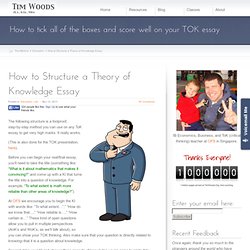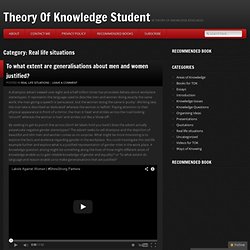

How to Structure a Theory of Knowledge Essay. The following structure is a foolproof, step-by-step method you can use on any ToK essay to get very high marks.

It really works. (This is also done for the TOK presentation, here). Sam Harris: Science can answer moral questions. TED: Ideas worth spreading. Real life situations - Theory Of Knowledge Student .com. Let’s pose the knowledge issue “Does God exist?”

Given that there is no proof for the existence of God what is relevant is an evaluation of reasons given to support the idea that God is a meaningful concept. Various arguments for the existence of God have been put forward. Www.brown.edu/Departments/Philosophy/onlinepapers/schechter/DeductiveReasoning.pdf.